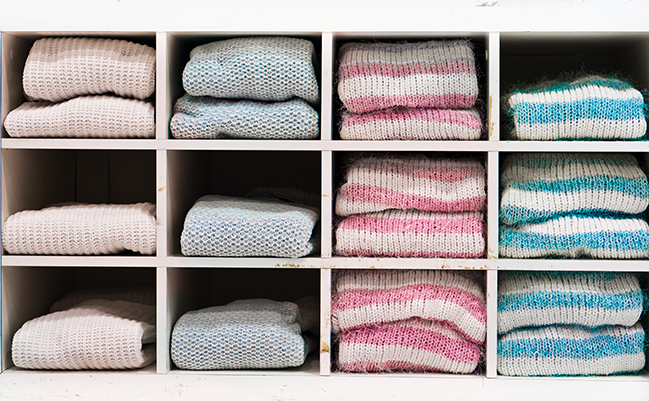
Clothing can say so much about a person; what a person is wearing can dictate the first impression you have of them. Despite that fact, sometimes people overlook the need to update their wardrobe and its contents. With the change of seasons now upon us, it’s time to consider updating and reorganising the contents of your cupboard.
Reorganising your wardrobe doesn’t have to be a major or daunting task. With these handy tips, you’ll have your space de-cluttered and ready for every fashion emergency, no matter what the season.
Separate your clothing into piles: uncomfortable clothes, daggy around-the-house clothes, clothes you can’t live without, a throw away pile, and a ‘maybe’ pile. This will help you determine what items you should actually keep.
Arrange your clothing into types: keep the t-shirts together, separate your jeans from pants or shorts, and split up work clothes from casual attire. Apart from being more practical, this makes finding specific items so much easier – especially when you’re running late on Monday morning.
Eliminate the mending pile. If an item has needed to be fixed or altered for more than three months, then you probably didn’t need it to begin with.
Try on any clothes that you’re unsure of whether you want to keep or discard. If you find the item too uncomfortable, big, or small, or too anything really – get rid of it.
While your wardrobe’s empty, make sure you give it a nice, thorough clean. Wipe down shelves and walls, vacuum or dust any spider webs, and remove scuff marks from the walls before rehanging and folding your clothes.
Resist the temptation to just jam everything back into your wardrobe. In creating some type of storage system you’ll make your clothes easier to put away as well as easier to find. Even go so far as to group skirts together separately from dresses, and casual shirts away from work shirts. Within these groups, try to store items of similar colour together. Not only will your wardrobe look better but it’ll be much more accessible.
Try to live by the rule that if you haven’t worn an item in the last twelve months, it’s time to get rid of it. That’s right, no matter how attached you are to the outfit, throw it away. This obviously doesn’t have to apply to expensive, formal clothing, but to casual everyday clothes and footwear.
Another good rule to live by is that every time you add something new to the wardrobe, remove another. This will help stop you from accumulating excess clothing.
If you don’t have a lot of storage space, consider investing in specific storage solutions, like shoe hanging racks or clothing dividers.
If you have seasonal clothing, try to keep it separate from the rest. If you don’t have space in the wardrobe, consider storing heavy winter jackets or light summer dresses when they’re not in season. This could be done with boxes, vacuum packed bags, suitcases, or plastic tubs, but it’s essential to make sure they are clean, stain free, and totally dry to prevent damage to your clothes.
Store items of similar materials together. Try to keep satin with satin or cotton with cotton. This will make your items much easier to find.
Don’t forget to sort through your underwear drawers and throw out anything that is old or worn. This part of our clothing is often left behind, so don’t forget to rifle through those undergarments!
Always keep extra coat hangers. These are handy for when unexpected guests arrive, or for airing out seldomly used clothing. We all know the frustration of not having enough coat hangers, and that just leads to a messier disorganised wardrobe, so keep the extras!
Don’t keep clothing that doesn’t fit. There is nothing worse than overly baggy clothes or items that are obviously too small. If you’re aiming to lose weight, keep one outfit to motivate and inspire you, but get rid of the rest. A new body deserves a new wardrobe!
The most important thing to remember is to never throw out something you’ll regret doing later. If you end up with a pile of clothes that you want to keep for nostalgic reasons, pack them into a box with some moth balls and put it in storage.